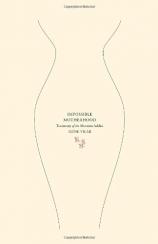Reading Group Guide
Discussion Questions
Impossible Motherhood: Testimony of an Abortion Addict

1. Vilar, a pro-choice feminist, was hesitant to write this book for fear that it would be misunderstood or compromise a woman’s right to choose. Why do you think she eventually changed her mind? Do you think her initial fears might be realized?
2. On page 34, Vilar writes that her first memoir, The Ladies Gallery --- which she wrote while married to her first husband and details the traumatic lives of three generations of women in her family --- “reads to me as proof of the lie I have at times made of my life.” Vilar continues to say that “the story I told was true, but it could have been truer.” Were there moments in Impossible Motherhood in which you thought the narrator was holding back?
3. What events led the narrator to her “abortion addiction”? How was she able to rationalize her abortions? Did her reasoning change from her first abortion to her last?
4. Throughout the book, Vilar paints elaborate backdrops to accompany her fascinating life story. She goes into intense details --- about her childhood home in Puerto Rico, sailing the open sea, the bustling neighborhoods of New York City, and the vast mountains of Colorado, among others. How important is locale to Vilar? How do each of these places echo the changes she goes through?
5. How did Irene come to fall under the spell of her first husband? What qualities drew her to him?
6. During the eleven years the author was married to her first husband, what changes did Irene go through? How was he able to exert so much control over her early in their relationship? Was she eventually able to break free? Could you relate to any part of their relationship?
7. Many authors choose to change the names of persons in their books when writing a true story. Why do you think Vilar chose to completely leave out her first husband’s name? Did you find this distracting?
8. Impossible Motherhood delves deep into the nature of relationships. Throughout the book, we see the author as a devoted young wife, confused daughter, distraught patient, caring sister, conflicted granddaughter, inconsistent friend, loyal pet-owner, and finally a loving mother. Are there similar qualities in the people Vilar seeks out in her life?
9. What does Vilar discover when she begins to write? How does she balance the therapy writing provides her with her first husband’s pressure on her to “write her story”? Does she feel resentment toward him for encouraging her?
10. What characteristics do you feel Vilar has inherited from her family members (especially her parents and grandmother)? Does she embrace or reject these qualities? Why?
11. Vilar was initially hesitant to accept her second husband’s marriage proposal because she was finally gaining control of her life and making it her own. Why do you think she ultimately accepted, considering the consequences of her first marriage?
12. How is U.S. colonialism in Puerto Rico portrayed in Impossible Motherhood? What are Vilar’s attitudes toward the country that imprisoned her grandmother, exploited so many women of her country, and eventually became her home?
13. On page 165, Vilar quotes Simone de Beauvoir, who wrote, “Your past is the situation you are no longer in.” Do you believe the narrator has moved on from her past? If not, what aspects do you feel still resonate?
14. Do you agree that Vilar was addicted to abortion as is stated in the subtitle? If not, what was it that she was really addicted to? How does she ultimately break her addiction?
15. On page 167, Vilar explains to her writing teacher, “I had twelve abortions in eleven years with my ex-husband, and they were the happiest years of my life.” Why does she say this?
16. What were your first impressions upon hearing the title or premise of Impossible Motherhood? Did those impressions change after reading it? With abortion being such a polarizing issue, were you expecting the author to have a political platform? Did you feel one present within her story?
17. Does Vilar redeem herself by the end of the book? If so, how?
Impossible Motherhood: Testimony of an Abortion Addict
- Publication Date: October 6, 2009
- Paperback: 240 pages
- Publisher: Other Press
- ISBN-10: 1590513207
- ISBN-13: 9781590513200







